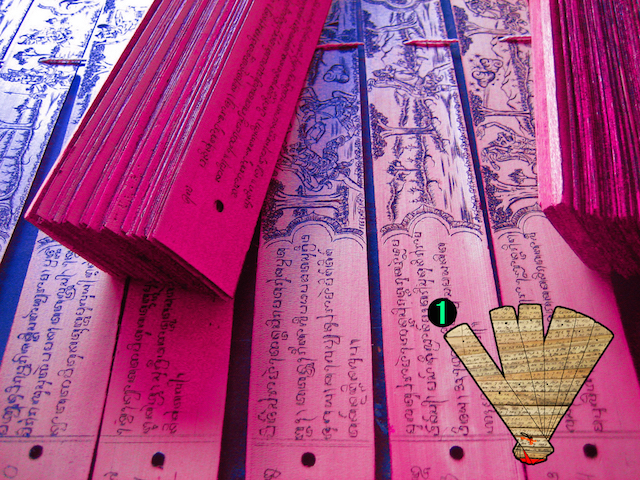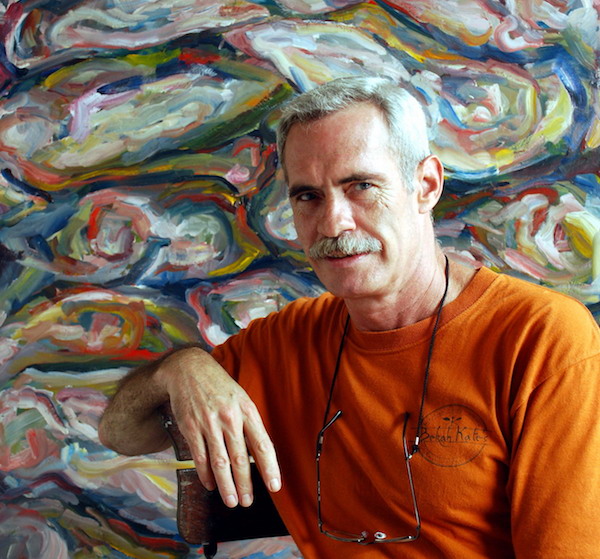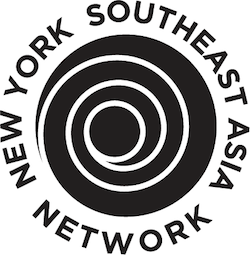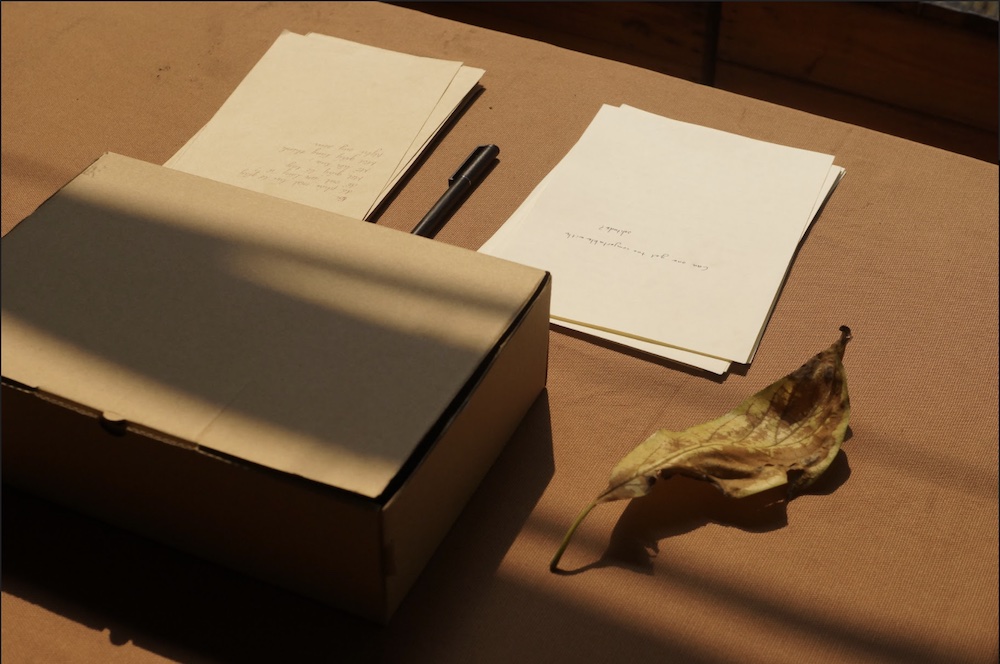What does it mean to be a guest of honor at the Frankfurt Book Fair? John McGlynn talks about the Lontar Foundation’s role in bringing Indonesian literature to the world and his own path from puppet maker to translator.

August 27, 2015
This is the first in a six-part series on literature in translation from Indonesia. Look out for more on The Margins in the coming months.
Series Introduction
Indonesia is a puzzle. It is the world’s fourth largest nation and home to the greatest number of Muslims on the planet, yet much of the country’s history and contemporary politics is unknown to outsiders. Indonesia’s literature, rich and vital, is even more unknown. There are many reasons for this. The 17,000 islands strewn along the equator are too diverse and complicated to fit in any simple narrative. Its political history—from feudal states to sultanates to colony to leftist outpost to a Cold War killing field and dictatorship and now a struggling, flawed democracy—defies easy explanation. And global structures that determine whose voices matter have too often relegated Indonesian writers to the periphery.
Indonesian’s stories may not be well known, but Indonesian writers are capturing them. Slowly, the rest of the world is starting to pay attention. This year Indonesia is the guest of honor at the Frankfurt Book Fair, the first time a Southeast Asian nation has been chosen to showcase its culture at the largest and most important publishing event in the world. Indonesia’s slogan for this event, “17,000 Islands of Imagination,” evokes the commonplace of Indonesia as “an imagined nation,” and perhaps indicates that even the national organizing committee doesn’t know what keeps this country together. Inspired by Frankfurt, AAWW decided it was a perfect occasion to introduce a series on Indonesian literature in The Margins.
Our occasional series, spread out over the next six months, is designed to introduce some of Indonesia’s most gifted writers and give readers a flavor of an expansive literary tradition that weaves together cultures, histories, religions, languages, and myths.
Next month’s issue revolves around writers re-imagining and re-writing official history through fiction. Freedom of expression was largely suppressed during the Suharto dictatorship (1965-1998), and the state insisted on official versions of history and identity. Since Suharto’s overthrow, many writers and poets have turned to what happened in 1965, when a coup attempt was blamed on the Communist Party and the military oversaw one of the largest mass murders of the 20th century, killing up to a million Indonesians and imprisoning a million more. Later in our series, we will explore writers and poets who draw on the colonial period as they reimagine what is Indonesia and what it means to be Indonesian.
Since 1998, there has been a renaissance of art, culture, religion and politics. But it has been a noisy, clashing, and sometimes brutally violent renaissance. Many writers are exploring Indonesia’s deep divides, especially over Islam and a rising Islamic identity. Our series will showcase how ongoing debates, and occasional conflicts over what it means to be a “good” Muslim, have inspired writing. Also since 1998, there has been an explosion of women writers pushing boundaries, breaking taboos and reimagining gender relations. Our series will showcase the work of some of these women.
This month, in our first installment, we look at one organization and one individual who has devoted his life to putting Indonesian literature into the global conversation. Without John H. McGlynn and the Lontar Foundation, Indonesia would not be in the spotlight at Frankfurt, and we wouldn’t have such a rich selection of novels, short stories, and poetry to choose from for this series. We begin with an interview with John McGlynn on the arc of Indonesian literature.
—Margaret Scott

How did you first become interested in Indonesia? What drew you to the country’s language and literature and eventually to the founding of the Lontar Foundation?
When I was a student of theater and fine arts at the University of Wisconsin-Milwaukee in the 1970s, I was introduced to Javanese shadow puppets and began to design and produce shadow puppets of my own. Mine were not well-known figures in the Javanese puppet pantheon, but characters more commonly known to a Western audience. I learned to create wayang facsimiles, but I had no idea how to manipulate them. To do that, I decided, I would have to study in Indonesia. And so, in 1973, I began to immerse myself in all things Indonesian through courses on Indonesian language, literature, history, and geography. In two years’ time I crammed the equivalent of four years of language study and finally felt ready to go to Indonesia.
In 1976, a scholarship from the U.S. Department of Education took me to Malang, where I participated in a three-month intensive advanced Indonesian study program. Through a series of unexpected events, I continued my study of Indonesian language and literature rather than establishing a cutting edge puppet theater, which had been my plan at the time. I lived in Indonesia for three years, and then moved to the University of Michigan in Ann Arbor, where I pursued a Masters degree in Indonesian literature.
During my time at the University of Michigan and for several months after graduation, I worked on occasion for the U.S. Department of State as a simultaneous translator and escort-interpreter. I escorted Indonesian VIPs around the country—introducing them to the United States and interpreting for them in a wide range of situations. More than anything else, this job made me understand the unique position that the translator plays in introducing people to a world foreign to their own. A translator creates the linguistic and cultural bridges that enable the foreigner to understand the world he’s seeing. Without translators in this world there would be no meaningful intercourse between cultures. This insight caused me to alter my career course from the academic study of Indonesian culture and literature to the field of translation, through which I hoped to build the bridges that were needed for other cultures to more easily understand Indonesia.
In 1981, I moved back to Indonesia and began to support myself as a translator of written material—primarily bank reports, political studies, economic reports, and so on. Almost nothing literary, though I did continue to subtitle films and managed to produce translations of a couple novels and a collection of women’s poetry. The situation was extremely frustrating. My heart was in the translation of texts related to language, literature, and art but no one paid anything for the translation of such materials.
Ever since I had begun to pay attention to coverage of Indonesia in the international press in the early 1970s I had noticed that articles about Indonesia were almost always negative. If they weren’t about the country’s dismal human rights record, they were about the pervasive corruption that riddled the country’s political and judicial systems. But it was now the mid-1980s, fifteen years later, and this situation still hadn’t changed. While I agreed that such stories were ones that needed to be told, I felt that they should be balanced by information of a more positive nature that revealed the country’s unique and varied intellectual and cultural traditions. This set me thinking on how I might be able to turn this situation around.
I had come to firmly believe that the only way to truly learn about another culture is through its literature. And so, after more than a decade of speaking Indonesian and having become fairly adept at translating, I came up with the idea of starting an organization devoted to the introduction of Indonesia abroad through literary translations.
I discussed this idea with Sapardi Djoko Damono, a former teacher of mine at the University of Indonesia, and Goenawan Mohamad, editor-in-chief of Tempo magazine at the time. They, too, agreed that there was need for such an organization and soon called in two of their close friends, the writers Subagio Sastrowardoyo and Umar Kayam, to join the cause. Together, the five of us determined the organization’s primary objectives, those being to foster greater appreciation of Indonesian literature and culture both within and outside Indonesia; to support the work of authors and translators of Indonesian literature; and to improve the quality of publication and distribution of Indonesian literary works and translations.
After that, all we had left to do was to find a name! I wanted a one-word name for the organization, one that had something to do with literature and was both easy to remember and pronounce. As most Indonesians are aware, the lontar palm is an especially useful tree and for centuries the leaves of this tree—after being dried, cured, and cut to the proper dimensions—have served as the raw material for indigenous scribes in the production of literary manuscripts. In addition, the palm’s fan-shaped frond is very attractive and lent itself easily to the creation of the organization’s logo.
And so it was, on 28 October 1987, the Lontar Foundation was officially established. Our choice of date for the founding of the organization was intentional—October 28 being National Youth Pledge Day, a day commemorating the oath formulated at a nationalist youth congress in 1928 that “Indonesia” would henceforth denote one language, one people, and one country.
Indonesia is guest of honor (GOH) at this year’s Frankfurt Book Fair (FBF). What do you think Indonesia’s selection as GOH has meant and will mean for Indonesian literature, both in Indonesia and abroad?
An invitation to be guest of honor at FFB is a once in a lifetime opportunity. FBF can be compared to the United Nations of the book world, but just as at the real U.N. in New York, where all countries are supposed to be equal, in Frankfurt too, there are some countries that are “more equal” than others. Preeminent members of FBF’s “security council” include the United States, Great Britain, and Germany but a country’s selection as GOH gives that country, at least for a year, a special place on a well- illuminated stage.
Media coverage for the guest of honor at FBF is second to none and begins six months before the actual event in October. With about 10,000 accredited journalists from 60 to 70 countries, FFB is the book-publishing industry’s largest media event.
In the run-up to their appearance as GOH at FBF, previous GOH countries have established translation funding programs to ensure that enough literary texts get translated into German, English, and other major languages before the time of the event. To its credit, the Indonesian government established such a program but, unfortunately, not until last year—which was far too late to promote participation in the program by foreign publishers, most of whom have their catalogue for a given year readied at least one year in advance. Despite this very real problem, there is real hope that Indonesia might finally begin to see its writers take their place on the global literary stage.
But without long-term commitment on the part of the government, realization of that heretofore evanescent goal of putting Indonesia on the world’s literary map will not be achieved.
Indonesia’s diversity is mind-boggling. Could you tell us a bit about this diversity (ethnically, linguistically, religiously and so on), and how Indonesian literature reflects, engages or fights with this astounding diversity?
H.B. Jassin, the late Indonesian literary critic known as the “pope” of Indonesian literature, got it right when he said that the development of both Indonesian language and literature came about not only as a means of aesthetic expression, but was used by early Indonesian writers as a medium for national struggle. Starting in the early 20th century, early nationalist writers began to consider Malay—which they called “Indonesian”—their “national” language and used it to proselytize for a modern and independent Indonesia in which both the Dutch and the moribund, tradition-bound past could be set aside or forgotten. Ever since that time, Indonesian writers have played that role: raising for public discussion topics of societal significance and through their use of this common language, creating a dialogue that crossed all borders of the country’s immense number of islands. Indonesian authors more than members of any other profession, the military included, have helped to forge the harmoniously integrated and fundamentally tolerant country that Indonesia is—even despite or, perhaps because of, periodic incidents of ethnic and religious intolerance.
As for modern Indonesian literature reflecting or engaging with diversity, a brief perusal of the history of modern Indonesian literature shows clearly that such is the case. I implied earlier that the literary output of pre-independence authors served to promote nationalism. Later, at the end of World War II, when Indonesia gained its independence in 1945, emerging writers turned to other themes and concerns, and literature of the Sukarno era in the 1950s and early 1960s mirrored the political upheavals of the time. At that time, many writers, disillusioned with the results of the revolution, stressed the need for political change and social justice.
Writers who began to publish after the establishment of the New Order government in 1966, followed a variety of different paths and styles, although the avoidance of direct political criticism and the formerly-popular social realism became a common trademark of this period, deriving from the government’s enforcement of its wish for political stability and consensus. Many of the writers from this period (which extends from 1965 until 1998) were forced to rely on an increasingly vague use of language in order to convey elusive or hidden meanings.
Since the fall of Suharto in 1998, numerous writers have changed tactics and adopted a more “in-your-face” approach, something virtually unheard of in the preceding thirty years. Much of this new literature contains overt social protest – as if writers have now come back to reclaim the role they once played in the first part of the century when literature was a tool for promoting educational and political reform.
There have been many pivotal moments in Indonesian history, but none so violent or tumultuous as 1965, shorthand for the aborted coup that was blamed on the communists and led to the one of the worst massacres in the 20th Century. How have Indonesian writers dealt with Indonesian history, particularly the mass killings in 1965-66?
Indonesian authors writing about 1965 is not something new. A fairly large body of literary work, beginning from 1966 until today, testifies to that fact. Indonesian authors have dealt with that horrific time in poetry, short stories, novels, and essays too. What’s different about recent literature on 1965, is that most of it is being produced by writers who weren’t even born at that time, who never witnessed first-hand those years of living dangerously that preceded and followed the mass killings in 1965-66. Perhaps, for that reason, this newer literature is more historically analytical, more interested in trying to figure out why what happened than actually telling the story of what happened.
Next month, we’ll be publishing an excerpt from Leila Chudori’s novel Pulang, or Home. Can you tell us a little about the book, and what your experience was in translating it into English?
Home, the English title of Leila S. Chudori’s novel, Pulang, is a remarkable analysis of the impact of the “1965” but while the tumultuous events of that period are the backdrop of the story, Home is not simply a story about ideology or political power. Going back and forth, both temporally and geographically, between Jakarta and Paris in 1965 and 1998, Home is about the lives of the Indonesian exiles, their families and friends, including those left behind in Indonesia. This story is one of love, lust, and betrayal but one that also includes laughter, adventure and lots of food. “Indonesia” exudes from most every page of the novel, which is why I wanted to translate it. I want an international readership and, more specifically, my family and loved ones in the United States, to see the world that I know to be Indonesia.
This series has been made possible by the Lontar Foundation and the New York Southeast Asia Network





